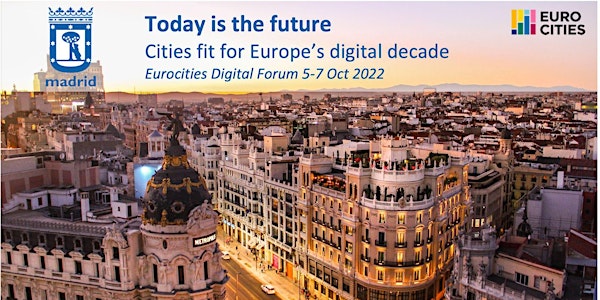YOU CAN STILL FOLLOW THE LIVESTREAM ON OUR YOUTUBE CHANNEL AND CONTINUE TO PARTICAPE IN THE ACTIVITIES OF THE FORUM. THANK YOU!
The Digital Forum in Madrid offers a unique opportunity to discuss how cities are working to shape Europe’s digital decade and what they need to safely bring new technologies closer to citizens for a sustainable Europe.
Find more about the programme here
A public version of the programme is also available here.
- - - - - - - - - - - - -
The European digital agenda for the decade 2020-2030 sets clear ambitions and key milestones for the digital future of Europe. The EU needs to pursue policies that empower people and businesses to seize human-centred digital opportunities that contribute to a sustainable Europe. To support the Digital Decade, the European Commission has set up the Digital Compass, a policy program that defines concrete objectives for the digital agenda.
The compass stipulates that in the next years, European citizens should be empowered by providing at least 80% of the population with basic digital skills to support inclusion and a digitally skilled workforce. Secure and sustainable infrastructures should be implemented by providing 5G everywhere, facilitation of 10.000 secure and climate-neutral data, cloud & edge solutions and increasing the attention to cybersecurity. The digital transformation of businesses must be promoted by growing scale-ups to double EU ‘unicorns’, improving the uptake of cloud, AI and Big Data by companies and making more than 90% of SMEs digitally enabled. Lastly, more digital public services should be implemented by supporting their use with 80% of the citizens applying digital identity solutions and moving 100% of key public services online.
Complementing the concrete goals of the Digital Compass is the European concept of digital citizenship. It is embodied in the EU inter-institutional declaration on digital rights and principles for the digital decade(2022). The principles put people at the centre of digital technologies, propagating free choice, safe online environments, solidary and inclusive technology and services, equal and sovereign participation, and sustainable digital devices.
This extensive digital agenda with concrete objectives and the guiding principles has a relevant impact on the local level. It can provide the framework for political momentum, local implementation strategies and funding opportunities to drive the development of European communities.
For some cities, it means facilitating the digital transformation of the administration and promoting the application of technology as a means to improve the efficiency of municipal services, the quality of life of its citizens and the well-being of people. Other cities focus their efforts on the development of digital twins with regional partners to realise sustainability gains and to improve their policy making. As innovation hubs, some work together with the national level to focus specifically on safeguarding democratic processes with the implementation of Artificial Intelligence and similar emerging technologies, while yet others are involved in European collaborations on the development of a European data space for smart communities to facilitate access to and reuse of data.
Local administrations are aware that making the vision of a digital Europe a reality requires communication, coordination, collaboration, and execution on different levels. They connect actors and stakeholders from different domains and on several levels of government. Their digital strategies and versatile initiatives permit them to scale-up the EU digital vision by localising it, shaping smart solutions which are adapted to the specific needs of their local communities. To make the digital decade work for its citizens, multi-level governance is essential.
